18 January 2018
Ngai Mutuoboro was born in Chuka, Kenya, in 1939. He describes it as being in the period “when the colonial people came”[1], during the time of British colonialism. Ngai explains how the colonisers took his community’s land. He believes this was the main reason behind the subsequent Mau Mau Uprising in the area[2], saying “the land that the colonial people were expected to give back to the Chuka people; they never gave back all of it”.[3] During the uprising, Ngai acted as a covert agent and passed information from the government to the movement. Ngai describes this as a very dangerous job: “when I was arrested by the white people I was beaten and tortured and all my teeth were knocked out. That is why I don’t have teeth. They (the British) sentenced me to death in 1953. I survived because of God”.[4] Some officers intervened on his behalf, moved by how young he was, at the time he was still a teenager. Even though the uprising did not succeed as it was hoped, Ngai Mutuoboro has continued to fight for his land to this day. Ngai is one of the founders of Atiriri Bururi ma Chuka (ABC Trust)[5], ‘Keepers of the Chuka Community Land’ in English, a grassroots organisation that has about three thousand members, whose purpose is to “safeguard the environmental rights and interests of the Chuka community”[6]. The ABC Trust has led a persistent struggle to recover their ancestral lands from colonial times to the present day.
The land claimed by the Chuka indigenous people is known to them as the forest of Magundo Ma Chuka, and is partially located in what is currently the Mount Kenya National Park and Forest Reserve. Mount Kenya was declared a Forest Reserve in 1934, and designated by UNESCO as a Biosphere Reserve and World Heritage Site in 1978 and 1997 respectively. While this status raised awareness of the area’s existence at a national and international level, it has also resulted in the claims brought by ABC Trust being suppressed and their resolution being delayed. As well as its immense ecological and economic value, Magundu ma Chuka is of great spiritual and religious importance for the community. The forest is the home of the community’s spiritual beings and some trees are considered sacred. The community used to perform rituals and celebrations in the forest to seek blessings for their lives. Ngai tells us how mugumo and muringa are trees of great spiritual value, and were used for medicinal purposes, “under that mugumo tree, people used to go there and pray for rain and when there was famine or bad spirits”.[7] Since Mount Kenya was declared a protected area, the community has been prevented from performing its traditional rituals, Ngai continues, “the Kenya Forest Service is the one that issues permits for you to be in the forest. So if you have to cross the boundary to the forest, then you need a permit which you pay for. Even if you just want to pray. As long as you want to access the forest, you pay for it”.[8]
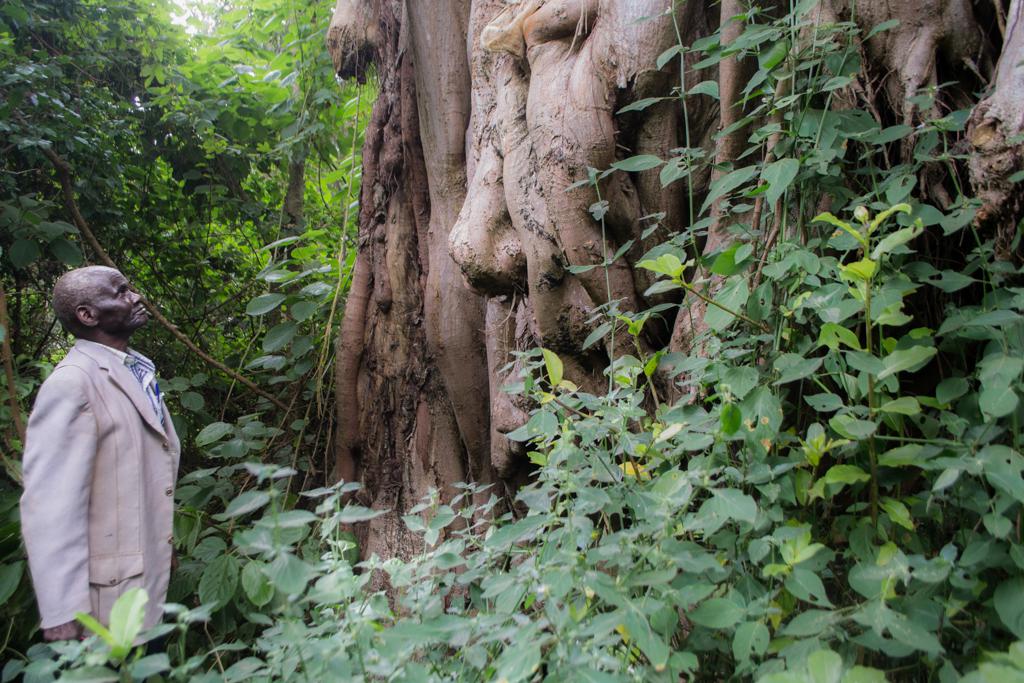
Ngai Mutuoboro beneath the mugumo tree - Photo: Delphine Taylor
The community is not just claiming that they have been prevented from living on their ancestral lands and practising their traditional rituals. They also express deep concern for the way in which the forest is being significantly degraded: the reduction and destruction of vegetation; soil erosion; restrictions of animals’ ability to move around; and the illegal logging and the introduction of species that damage the ecosystem[9] are some of the harms affecting the reserve in recent years, according to ABC Trust. Ngai tells of the specific case of the muthaiti: “it is a very expensive tree because of the wood, and that tree has been cut down in the forest so there are only a few left”.[10] The illegal logging in Mount Kenya reserve has been denounced in reports to UNESCO since 2000.[11] Ngai also expresses concerns over the introduction of species that affect the ecosystem, for example the eucalyptus: “if you plant the eucalyptus tree, it will spoil the whole land. The eucalyptus is used for commercial purposes: for electricity posts and firewood. The eucalyptus does not allow other plants to grow around it”.[12]
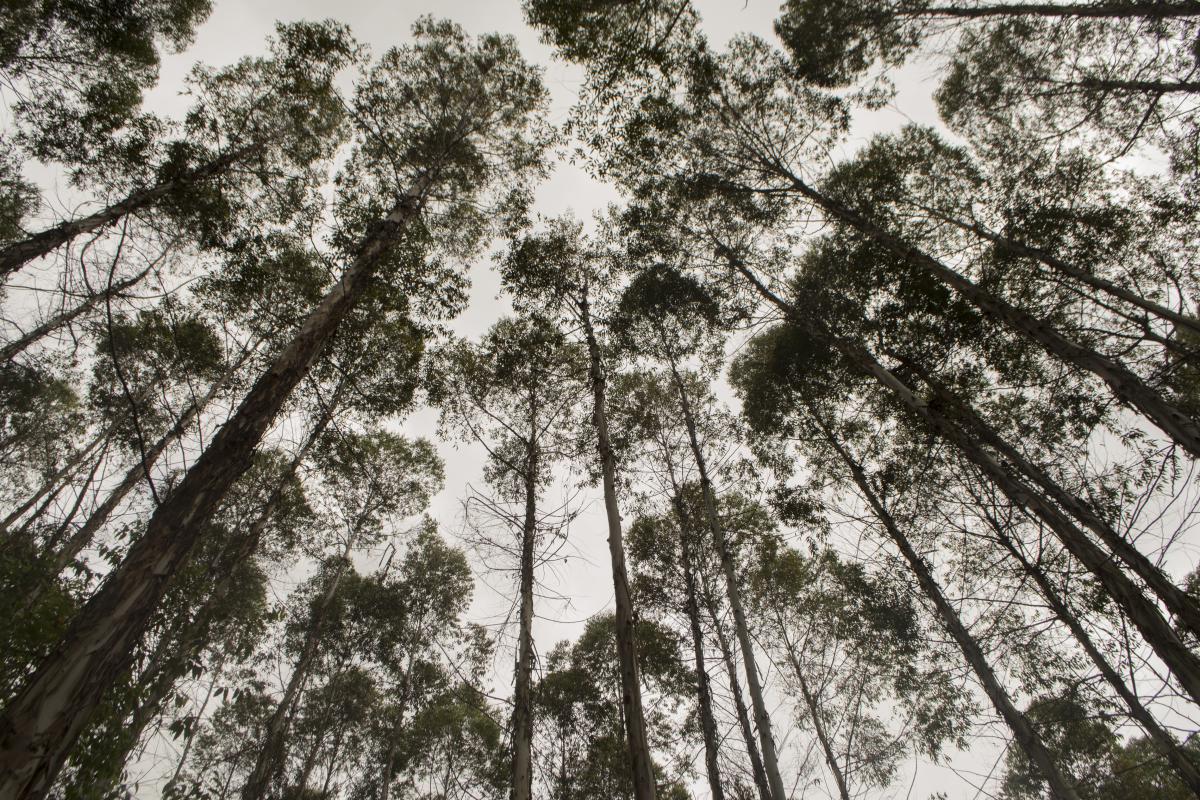
“If you plant the eucalyptus tree, it will spoil the whole land" - Photo: Delphine Taylor
The construction of an electric fence to delineate and protect the forest reserve has also been an issue of concern for ABC Trust. Its construction began in 2009 and its stated aim is to protect the surrounding inhabitants and their crops from damage by large mammals that stray from the forest.[13] UNESCO’s research[14] pointed out the consequence of this is the obstruction of the natural migration of these animals, especially elephants and buffalo, but it was eventually deemed the best option for reducing the harm they could cause.[15] ABC Trust’s opinion, however, is that building the electric fence was foremost a response to the need to limit access to the forest and protect the establishment of tourism projects in the area: Kiangodu Guest House and Tungo/Chungo River Lodge, whose construction have been approved.[16] ABC Trust warns that both the electric fence and the tourism centres will generate more harm and pollution than if the families had been allowed to live there.[17] This is why, in Ngai’s opinion, the prohibition on the community settling within the protected zone and entering the forest to perform its rites is less about ecological conservation than certain parties’ economic interests.
ABC Trust maintains that the community was not consulted[18] about their ancestral lands being turned into a protected area, and they have received no compensation of any kind for being evicted. Additionally, the community was neither informed nor consulted about the future tourism projects being set up in the area, or their potential impact. Since having been dispossessed of their land, the community members feel that many of their rights in both the 2010 Kenyan Constitution and international legislation, have been violated including: the right to live in an adequate and healthy environment; the right to culture and expression; the right to information; the right to land, food and water; and others. These incidents mean that ABC Trust has had to persevere in its struggle, and its members have had to find new ways of bringing its claims to public attention.
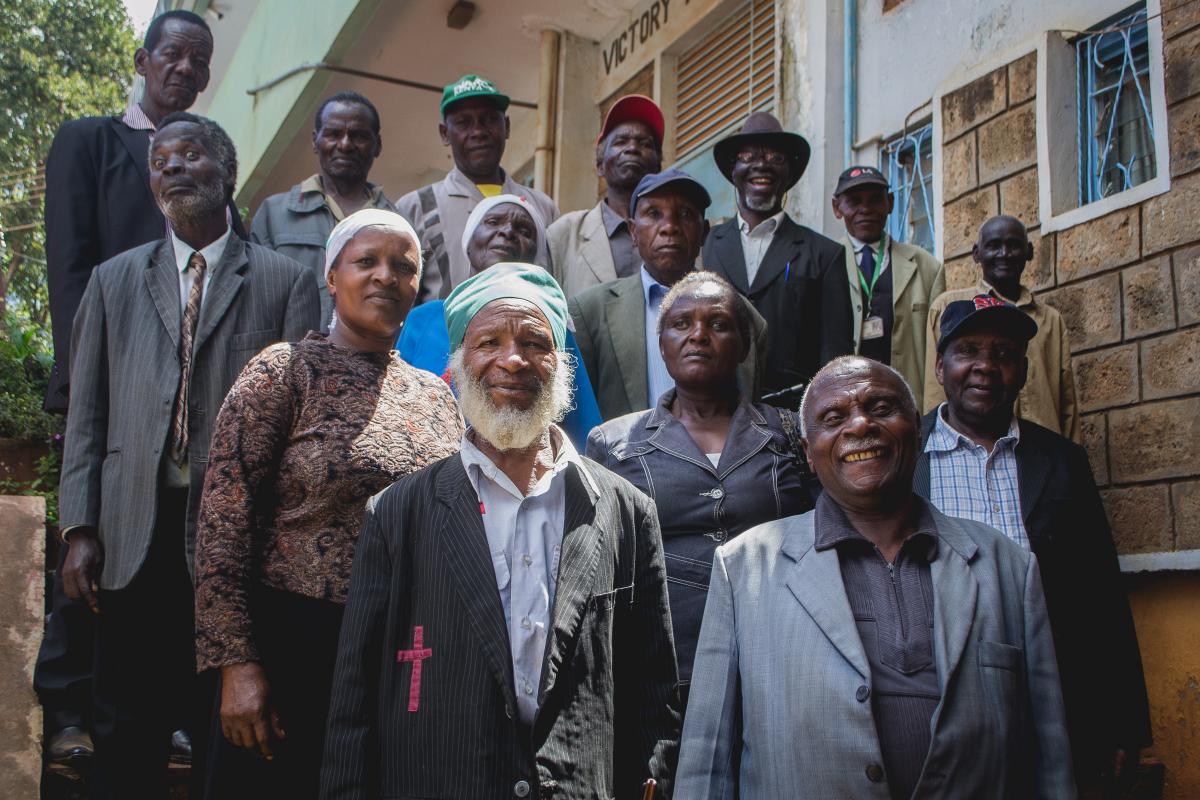
Behind each of these faces is a story of resilience amid the struggle for the land rights of the Atiriri Bururi ma Chuka community group - Photo: Delphine Taylor
ABC Trust’s strategies have included engagement with the government; in 1978, the case was presented to the government of the first President of Kenya, Jomo Kenyatta. The negotiations failed,[19] but ABC Trust continued its fight, and despite the lack of resources, it saw that legal avenues presented a possible means to uphold the rights of the community. This was the motive for Ngai, on behalf of ABC Trust, to get in touch with Wendy Mutegi in 2001, a human rights lawyer and daughter of a Chuka community elder, to ask for her advice on the case. Wendy remembers that when they began working together, ABC Trust did not have the documentation to show that the community was the legitimate owner of the land nor any legal structure for the agitating group. In a community with a predominantly oral tradition, they did not have any physical proof to support their claim. They knew from their ancestors that the land was theirs and where its borders stand. A visit by the Kenya National Commission on Human Rights in 2014 provided evidentiary proof of the community’s occupation of the area claimed by ABC Trust.[20]
In June 2014, with Wendy’s legal advice, the community brought a claim to the Court in Meru, requesting the protection of their ancestral land, and the Court ordered that licences granted to some of the logging companies be cancelled. Wendy estimates that, without this order, nine million trees would have been felled.[21] The existence of this order in favour of ABC Trust succeeded in raising awareness about the case, which had a direct impact on the security of its members. After taking the case to Court, ABC Trust community members reported receiving threats, being followed and put under surveillance. Wendy was warned that if she wanted to stay alive she would have to withdraw the claim and abandon the case, and she was the victim of a physical attack from which she managed to escape.[22] Last year, a member of ABC Trust was shot and killed by security guards when he was monitoring the forest.[23]
On 18th September 2014, the Court revoked the order banning the felling of trees in the area claimed by the ABC Trust. Because of this, Ngai speaks of how four hundred members of the community, led by the elders, decided to peacefully occupy the forest to protect the sacred trees. On 8th January 2015, the group of protesters saw their mission thwarted when nineteen of their members, most of whom are in their seventies and eighties, were arrested for illegally occupying the forest. The case against the protesters continues to this day. The hearings have been postponed a number of times, witnesses have failed to appear, specifically the forest guards, and the process has been delayed year after year. Wendy has identified a criminalisation strategy clearly at work in the case, the aim of which is not just to sap the community’s spirit, but also to delay its claims and impede its struggle.[24]
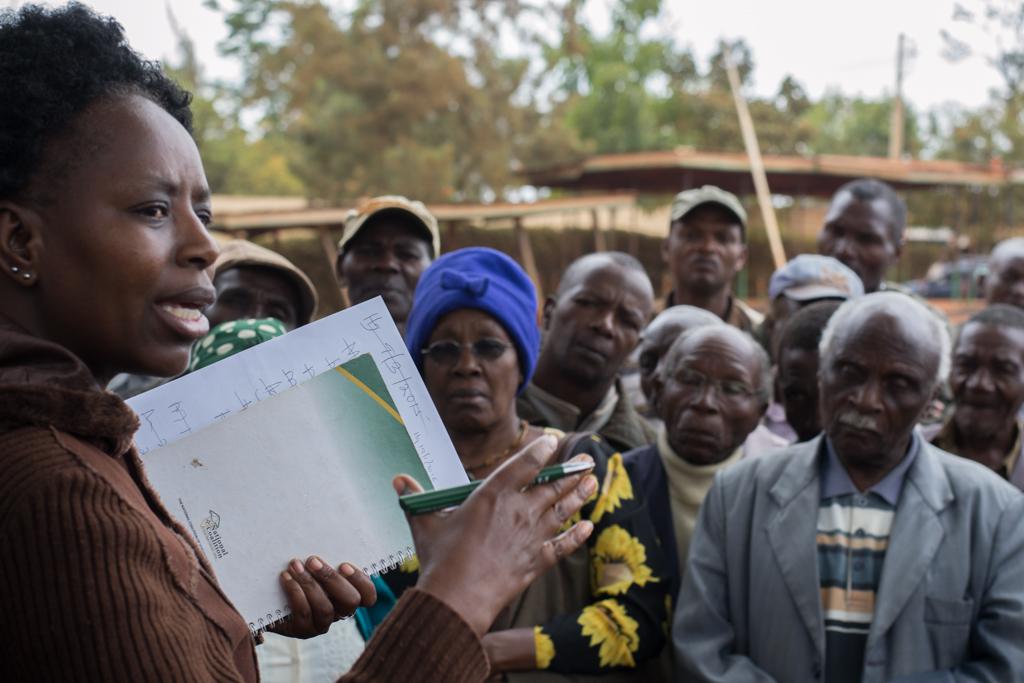
Wendy Mutegi providing some of ABC Trust's members with an update on their court cases - Photo: Delphine Taylor
In Kenya, this criminalisation strategy, coupled with a legal vacuum surrounding indigenous rights and a young and incomplete land restitution policy,[25] are factors that suppress the ABC Trust’s plight, and are an obstacle to the Trust obtaining justice. Kenya has no specific legislation for indigenous peoples, and it has yet to sign the United Nations Declaration on the Rights of Indigenous Peoples or ratify the International Labour Organization’s Convention 169. The Convention lays down fundamental instruments that enable communities and states to protect ancestral lands.[26]
The keepers of Chuka community land will, according to Ngai, continue to seek justice for as long as they live, but they fear that if things carry on as they are, there will be no more forest. Ngai says “We need help to continue fighting for the land. These things need to be taken to the highest level in Kenya and outside. There needs to be awareness that these problems exist. We need help from the human rights side.” [27] Ngai stresses that the government needs to be persuaded to take seriously this issue, which the Chuka people face, seriously. Ngai and Wendy do not rule out taking the case to the international level. There are some examples of land rights movements in the region that have had to go beyond the national level to find a solution. One example is the indigenous Ogiek people, who live on the border between Tanzania and Kenya (in the Mau and Elgon forests). After being forcibly evicted from their lands from 1911[28] onwards, a judgment by the African Court of Human and Peoples’ Rights, based in Tanzania, will enable them to return to live in their ancestral lands. “It is an unprecedented legal victory for an indigenous people in Africa. The ruling marks the first judgment from the highest institutional human rights body in Africa to favour the cause of indigenous peoples”,[29] rejoices Lucy Claridge, the legal representative of Minority Rights Group after the Court’s decision.
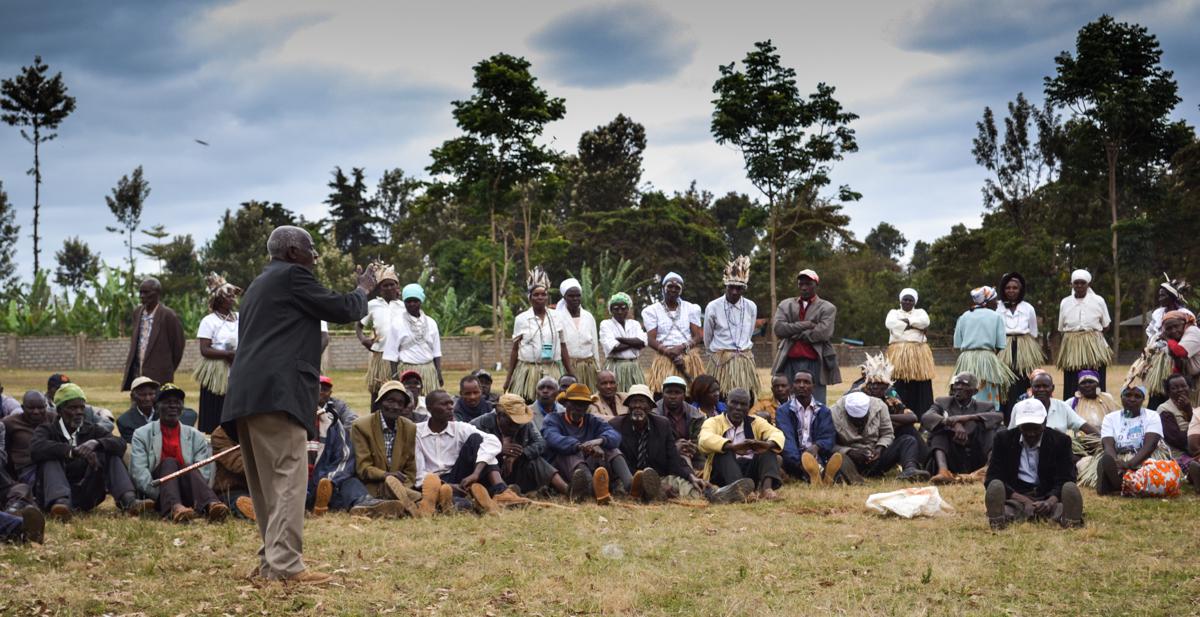
According to Land Rights Now movement, up to 2.5 billon people depend on indigenous and community lands, but currently have rights to just 1/5 of that land - Photo: Brandon McNally
ABC Trust’s commitment is truly inspiring. They are elderly people who, by listening to their ancestors, have continued to persist in their struggle to recover their lands and they do so without seeking any benefit other than to return to live there and to protect the forest. “They are dying. But they die with dignity and with conviction. They are not pushing for the recognition of the rights of the Chuka people for their own benefit. It is for the benefit of the future generation”[30], comments Wendy.
Ngai is visibly nostalgic when he explains that he too could die without seeing the fruit of his struggle: “if we are given back our land, the trees that were cut down will be planted again. Because the tree is the one that brings rain and saves the forest”.[31] He has spent years trying to recover the land, but he has not lost the hope of one day coming back to participate in the life of the forest that he yearns for.
Delphine Taylor & Paulina Martínez Larraín
* Cover photo: Pia Uçar
[1] PBI Kenya: Interview with Ngai Mutuoboro, Founder and Committee Member of Atiriri Bururi ma Chuka, Chuka, 7 September 2017.
[2] The Mau Mau Uprising was a Kenyan revolt against the British administration between 1952 and 1960. Though the movement was a military failure, it probably contributed to the subsequent inedependence in 1963.
[3] PBI Kenya: Interview with Ngai Mutuoboro, Op. cit.
[4] Ibíd.
[5] About ABC Trust: it was legally created in 2011, but the community has been fighting for its land since the 1930s. Interview with Ngai Mutuoboro, Op. cit.
[6] Kenya National Commission on Human Rights (KNCHR), Letter from Patricia Nyaundi, Comission Secretary, to Kenya Forest Service Director, Reference: KNCHR/CID/PETGEN/vol.XI/2015, 8 de diciembre de 2015, p.1.
[7] PBI Kenya: Interview with Ngai Mutuoboro, Op. cit.
[8] Ibíd.
[9] The High Court of Kenya T Meru: Petition No.9 of 2014, Point 14.
[10] PBI Kenya: Interview with Ngai Mutuoboro, Op. cit.
[11] UNESCO, available at: http://whc.unesco.org/en/soc/2403
[12] PBI Kenya: Interview with Ngai Mutuoboro, Op. cit.
[13] These conflicts relate to poaching, starting forest fires, illegal logging and incursions by animals into areas where the communities live. UNESCO, Report 2013. Op.cit.
[14] UNESCO, Op. cit.
[15] Ibid.
[16] The High Court of Kenya T Meru: Op. cit., Point 25;
[17] KNCHR: Report on a fact-finding mission in Chuka, Tharaka Nithi: Petition by Trustees of Law and Social Development Trust and Atiriri Bururi ma Chuka Trust, 25 and 26 November 2014, p.2.
[18] The High Court of Kenya T Meru, Op. cit., Points 14 and 7.
[19] In 1978, ABC Trust and the government initiated negotiations through the Minister for Lands, Jackson Angaine, who decided to restitute 6,000 hectares of land to the community, a quarter of the total claimed by the community. However, according to Ngai Mutuoboro, the Minister was going to retain half their land, which is why the community declined the offer. In KNCHR: Op. cit., p.8.
[20] KNCHR: Op. cit., 2014, p.2.
[21] Panbazuka News: Kenya: Human rights lawyer Wendy Wanja Mutegi receives threats, 3 October 2014.
[22] Thomson Reuters Foundation: Terror at midnight: abduction trauma of Kenyan woman fighting for forests, 28 March 2017.
[23] Reuters: Logging in Mount Kenya forest pits politicians against local community, 20 July 2016.
[24] PBI Kenya: Interview with Wendy Mutegi, human rights lawyer, Chuka, 8 September 2017.
[25] IWGIA: Indigenous peoples in Kenya; Kenya Gazette Supplement: Community Land Act, 7 September 2016.
[26] International Labour Organization (ILO) Convention 169 concerning Indigenous and Tribal Peoples in Independent Countries, is an international treaty adopted in Geneva in 1989. The Convention establishes a number of principles regarding the use and transferal of indigenous lands and natural resources. http://www.ilo.org/dyn/normlex/en/f?p=NORMLEXPUB:12100:0::NO::P12100_ILO_CODE:C169
[27] PBI Kenya: Interview with Ngai Mutuoboro, Op. cit.
[28] A report by Forest Peoples Programmes about the Ogiek documents a series of forced evictions from their lands from 1911, which continued after Independence in 1963.
[29] Al Jazeera: Kenya's Ogiek win land case against government, 26 May 2017.
[30] PBI Kenya: Interview with Wendy Mutegi, Op. cit.

